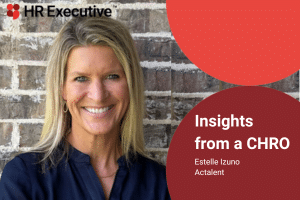Estelle Izuno spent more than 25 years in the sales operations of Actalent, a services and talent solutions provider for the engineering and sciences fields. She started as a recruiter in 1993 and, over the next few decades, went on to hold roles, including salesperson and director of market operations. Throughout that time, she honed her communication skills, led with curiosity and, most importantly, learned the business inside and out—capabilities that all equipped her for HR leadership.
In 2022, Izuno was appointed the firm’s first-ever director of employee experience, overseeing more than 5,000 employees across North America; Europe, the Middle East and Africa; and Asia-Pacific. The HR leadership role has allowed Izuno to tap into her front-line sales experience to strengthen both the candidate and employee experience.
She recently shared with HR Executive what she learned from her unusual path to HR and what she’s focusing on as Actalent closes out the year.
Izuno: Yes, 31 years. For me, it’s always the people. We really focus on hiring high-character people. That’s really, really important for us. When I was growing up in the company, I was around people living through these values every day; they were communicated over and over again, literally since I was 22. Knowing that—regardless of when things were tough—I was working around people with high values and high character, that’s been really important for me.
And it’s a very healthy, competitive environment. As a competitive person, I loved coming into it as a recruiter, competing in a healthy way next to my partners.
I’ve had several different positions and have been able to continue to move up. And that opportunity is basically for anyone to take; I’ve always loved that about the company too.
HR Executive: What skills did you develop in sales that translated well into HR leadership?
Izuno: Communication is the biggest thing in sales—and it helps you in life. When you are in sales, you’re thrown into some difficult situations that you have to navigate your way through. That was important. In sales, you have to get curious. You have to understand what the client needs, what’s most important to them. You can parlay that into this role—getting curious and understanding, what is it that our people need.
And being on the front lines of the business also for 28 years was really critical and invaluable for me. I have a really good understanding of the business—what it takes to be successful here, what our people need. Now, managing all the people operations, I can utilize that experience to help them.
HR Executive: What was the learning curve like when you took on the HR leadership role?
Izuno: It was a big learning curve, and I definitely fell on my feet a couple of times. When you’re running a sales operation, I recruited, I sold, I ran sales. You’re moving so fast every day, and your job is heavily focused on making sure your salespeople and your recruiters are hitting their metrics. As things changed in the company, sometimes when you’re far away [concentrating on sales], you don’t really understand the why behind it or why it took so long to get there. As somebody who was moving fast, if I wanted to change something, I’d want to change it tomorrow or today—in an hour.
Now that I’m running the people team, you realize how important decision-making is and how long that can take. That was the biggest a-ha thing for me. I learned how important it is to slow down a bit and really understand the decision and, more importantly, who is this going to impact. How is it going to make an impact on our people? You have to be cautious of that impact and how you communicate the why behind the change.
HR Executive: You’ve been on a “listening tour” to connect with employees. What’s been the impact?
Izuno: I’m really proud of what we’ve done here. We’ve had at least 13—if not more—People to Possible meetings. That’s our tagline, which means we’re creating growth and opportunity for all people. Myself, the president, the CFO and at least two other executives have traveled across the country meeting with different tenured groups, different divisions, really spending time with our people, listening to them and really understanding what’s going well, what’s not working, what we need to tweak, to fix.
From there, we’ve created several project plans to make improvements. One of our biggest initiatives that I’m probably most proud of from these meetings is our overall onboarding experience. We definitely heard from our people that the new hires needed the ability to onboard in a more effective way and that they needed to be able to start building relationships across the country from day one. As a result, we standardized our onboarding process so everyone has the same consistent experience—all the materials they’re learning, we hired onboarding leads to help make that experience even better, we created a standard start date across the company. All new hires, regardless of role, become part of a cohort when they join Actalent, and they get to know people across the country.
We recently did a Glint survey, and it’s very clear that our one-year employees are significantly happier than they have been in the past. I’m very proud of that accomplishment—basically from listening to people.
HR Executive: How does that investment in candidate experience translate to employee experience?
Izuno: We’ve been able to create a lot of programs in the last three years based on what we’ve heard from our people. A lot of it has been centered around recognition programs, career development, training. We’re constantly looking for ways to continue to make improvements so that the entire Actalent experience—from hire to retire—is a positive experience.
I’m really proud to say we’ve had over 100 people who have hit their 25-year-plus milestone. We want to make sure we’re celebrating our people and making sure that as they hit these milestones that we’re celebrating them. It’s not just that first- or second-year experience—but making sure the experience throughout their career is positive and that they’re getting the training throughout each stage of their life and development that they need.
HR Executive: What do you anticipate being your biggest HR leadership priority as we head into 2025?
Izuno: The big thing for me will continue to be listening tours. It’s a two-way street. We really learned to appreciate our employees and understand everything that they’re going through. We’ll continue to spend quality time with our people because it’s so valuable.
We spent a lot of time in 2024 doing leadership assessments on our director community. We’ve been able to do assessments, provide feedback and then have additional training to support our leadership. Next year, the next focus will be our practice leaders.
We’ve also had tremendous success with our ERG programs and our wellness programs this year and last year, so we’ll continue to grow those. For me, I have the whole HR business partner team within my group and we want to make sure they continue to support our directors and our people as best-suited as possible—making sure that’s very consistent support.
HR Executive: Who or what in your personal life most influenced the type of HR leader you are today?
Izuno: I ran the [sales] operation in Los Angeles for over 25 years, and I had an HR business partner—never knowing I’d ever have anything to do with HR—named Erica, who was incredible in her role. She was what I saw as the gold standard of what a business partner should look like. Going into this role, I wanted the same exact gold standard, and I wanted everybody in our company to have the same exact experience I did.
She was consistent. She built strong relationships. Each year, we set goals, our priorities—and when you’re running an office of 80-90 people, you can get pulled into so many different directions. She really helped me refocus, reeled me in a little bit, made sure I was paying attention to what I decided were my goals.
And she really stayed connected with my people. She came to visit the office. She did lunch and learns. She helped with individual development plans. Truly, a really supportive person to help the betterment of our company and my specific office. So, seeing what that gold standard looked like, I knew that my long-term goal would be that everybody has the same experience that I had.
Credit: Source link











